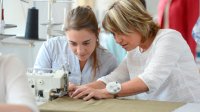Reaching Out to Businesses for Meaningful Career Education
Regional initiatives can offer high school students hands-on learning experiences with businesses to prepare them for life beyond school.
Your content has been saved!
Go to My Saved Content.When the mayor of Lee’s Summit, Missouri, wanted to entertain his community with a Main Street holiday light display, he enlisted robotics students from the local high school. They got the job done—on a tight budget and short timeline.
A local Goodwill Industries chapter faced a different problem: how to recruit and train 100 new volunteers. Kansas City students provided a solution by producing videos for the nonprofit organization to use on social media and its website.
Authentic learning experiences like these are becoming increasingly common across the Kansas City region. Through a regional initiative called Real World Learning, students from more than 30 districts in Missouri and Kansas are gaining career education through internships and projects for local clients.
Before the network began in 2017 with financial support and leadership from the Ewing Marion Kauffman Foundation, career education offerings were scattershot, reaching only about 15 percent of students across the region, and there was a mismatch between career education offerings and industries where students could find future opportunities. In some cases, schools were preparing students to earn outdated credentials that had little value, such as mastery of software or technology platforms no longer in use.
Through extensive collaboration by educators, parents, and business and civic leaders, there’s been a reset of career education goals. As it continues to grow, Real World Learning offers a model of collaboration that can energize career education in communities of all sizes.
Connect With Clients
Within the Real World Learning network, every school district has a designated B2E (business to education) point person to facilitate partnerships. At Fort Osage High School in Independence, Missouri, Dylan Peterson is the business and community coordinator.
Although she spends considerable time meeting with potential partners in the community, Peterson’s favorite role is working alongside teachers to design projects that have an authentic client. Whole-class projects ensure that all students have access to career education.
“Client-connected projects are new for teachers,” she acknowledges. “Their expertise is teaching.” By introducing teachers to experts in other professions—from health care to veterinary science to broadcasting—Peterson helps them design projects that meet academic goals while addressing real client needs. English teachers, for example, have had students work on everything from marketing campaigns to technical reports for a social impact organization.
Summer externships embed teachers in business settings for a short time. That helps build their awareness of the career opportunities awaiting students—if they’re prepared. “What industry professionals share over and over is that they’re less concerned about students’ content knowledge. They can train for that,” Peterson says. “They’re looking for ‘whole humans’ who can communicate, will show up on time, and are ready to learn.”
Focus on Local Opportunities
Schools don’t have to be located in big cities to find willing partners. “In a rural district like ours, we have to create our own opportunities,” Peterson says. Instead of knocking on doors of large corporations in Kansas City, she’s more likely to turn to a hometown heating and cooling contractor or a nonprofit with a hyper-local focus. She recommends looking for lower-stakes projects that are on a client’s wish list. “It’s something they wish they could get to but is not integral to their operations.”
The district itself offers more opportunities for authentic projects. “We’re like a small city,” Peterson says. “We have people working in maintenance, custodial, graphics, business, logistics, transportation. Students can be a part of all that without having to leave the campus.”
Model Expert Thinking
Communities beyond Real World Learning are applying similar strategies to expand career education opportunities through regional networks.
In San Antonio, Texas, Centers for Applied Science and Technology (CAST) is a growing network of schools that are aligned with career opportunities in fields ranging from medicine to hospitality.
“We want to grow more talent in the industry areas in each of our regions,” explains Ravae Shaeffer, principal of CAST STEM. “We work strategically with partners to understand what they need in terms of talent, and then backwards-map” from 12th grade to ninth to build students’ capabilities.
Designing projects requires that teachers understand the thinking skills needed to be successful in different professions. Shaeffer encourages teachers to consider, “What is the profile of a highly effective engineer or manufacturing technician? How can our students grapple with the same kinds of problems our partners are grappling with?” Students learn about drones, for example, by programming them to solve logistics issues for warehouses or monitor livestock for ranchers.
Michelle Triplett, mentorship coordinator for CAST STEM, connects teachers with industry partners willing to unpack their thinking. “Our teachers are experts on the pedagogy. They don’t have to be subject matter experts,” she says.
Along with projects that emerge through industry partnerships, students also identify problems that they want to solve. For example: What do you do with your pets if you become homeless? How can we design a pop-up shelter during Covid? What can we do about food insecurity? Such projects often have a service component, along with learning aligned to academic goals.
“Anything we do should be a contribution back to the community,” Shaeffer says. “We look at anybody in the community as a potential partner.”
Emphasize Equity
Expanding career education for all students is one of the goals of Real World Learning. At Fort Osage High School, the percentage of seniors with an authentic career experience on their résumé has grown from 28 percent in 2019–20 to 68 percent at the midpoint of this school year. “Our goal is to get to 100 percent of graduating seniors by 2030,” says Peterson.
That’s a different story than when she was a Fort Osage student herself. “Experiences like these used to be just for super-nerdy kids like me. We want to make sure all students have these opportunities.”
